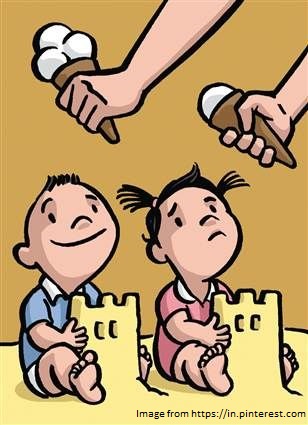Do we learn gender equality in Schools?

Anna Anandita is a 23 year old hailing from the temple city Bhubaneswar, Odisha. She is currently pursuing M.Tech in Chemical Engineering in National Institute of Technology, Srinagar. Apart from academics, she enjoys writing, painting, dancing and occasional singing. She is quite active on various social media platforms. She enjoys working with various social services organizations and is a firm believer of trying to make the world a better place for someone in however little way it might be. She dreams to help build a unified India, an India where the so-called taboos do not exist and where one can exist peacefully and have a life of their own regardless of gender, sexual orientation, age, location, language,etc.
Do we learn gender equality in Schools?
“Girls should not wear short skirts.”
Every girl has come across an instance such as this one- being told what to do, what not to do, how to dress, how to behave and even how to sit and stand. Parents seldom question or reprimand their sons for their behaviour but have a full-blown interrogation for their daughters. Parents with a protective mindset sometimes believe that restriction can ensure protection of their child and make them a better person. It is therefore not a surprise that our children are still unsafe. Curiosity is a must in children. If we fail to provide them the answers, they turn to the internet or peers for the same. Unintentionally, we are making them even more unsafe as well as vulnerable to the very things we hope they stay away from.
We have seen numerous reports of school-going children being victims of sexual abuse. Though parents do everything in the power to ensure their children remain safe, they sometimes forget that children can be harmed even in the safest of environments- like a school. The best way would be to educate their children in order to enable and empower them as individuals. Not just girls, but boys too are victims of sexual abuse and in case of child sexual abuse, the percent of boys is higher. Lack of knowledge regarding their bodies, their private parts, safe and unsafe touch, improper behaviour and severe lack of guidance are some of the reasons why children find it difficult to talk about an experience of sexual harassment they may have faced. Sex Education is still considered taboo. Talking about sex, sexual education, gender, appropriate and inappropriate behaviour openly with children and adults is the need of the hour. Such conversations need to be normalised. Teaching children to respect themselves and others, to understand their bodies and that of others, and to realise that bodily changes are normal would help children treat each other equally.
The constant discussion by elders on how “brave a certain boy is” or how “beautiful and caring a girl is” builds existing gender inequalities. It makes children believe that boys and girls differ. Even comments such as ‘a girl is born to get married’ and ‘a boy to get a job’ condition the way children begin to view themselves and others right from a young age. Many of the classic fairy tales have the handsome and brave prince coming to the rescue of the forlorn and distressed princess from the demons or witches. Such stories continue to reinforce gender inequalities in the minds of children making it even more difficult for them to imagine a gender-equal world. As girls reach puberty many of them face sexual harassment. If they talk about it, they are blamed and restricted from going out in public spaces in order to keep them ‘safe’. Previously, non-verbal sexual harassment like staring, ogling, commenting was called “eve-teasing” (which itself is a sexist concept) was taken very lightly. Punishment for such offences and correction must be instituted very early. Girls should be encouraged to complain and teachers must sensitised to intervene early enough and create an atmosphere conducive to the needs of growing children. Children need to be encouraged equally in all areas- education, sports and extra-curricular activities. Girls must not be told that they should not swim or exercise when they have their periods. They should not be asked to eat less than the boys or go home early because the roads are unsafe. Instead, they should be taught how to take care of themselves and develop confidence.
An important step in making an equal world is the classroom.
Opinions are of the writer.
REFERENCES:
https://www.thehindu.com/thehindu/edu/2001/12/18/stories/2001121800030200.htm
http://www.ncert.nic.in/departments/nie/dse/activities/advisory_board/PDF/Genderconcerns.pdf
https://www.jaagore.com/power-of-49/how-bangalore-is-tackling-gender-bias-one-school-at-a-time
http://www.teachersofindia.org/en/article/gender-equality-classroom

